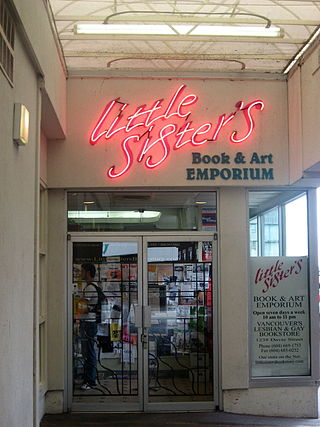
R v Oakes [1986] 1 SCR 103 is a Supreme Court of Canada decision that established the legal test for whether a government action infringing a right under the Canadian Charter of Rights and Freedoms is justified. David Oakes challenged the validity of provisions under the Narcotic Control Act that provided a person found in possession of a narcotic, absent of evidence to the contrary, must be convicted of trafficking the narcotic. Oakes contented the presumption of trafficking violated the presumption of innocence guarantee under Section 11(d) of the Charter.

Egan v Canada, [1995] 2 SCR 513 was one of a trilogy of equality rights cases published by a very divided Supreme Court of Canada in the spring of 1995. It stands today as a landmark Supreme Court case which established that sexual orientation constitutes a prohibited basis of discrimination under section 15 of the Canadian Charter of Rights and Freedoms.

James "Jim" Keegstra was a public school teacher and mayor in Eckville, Alberta, Canada, who was charged under the Criminal Code with wilful promotion of hatred against an identifiable group, the Jewish people, in 1984. The charge led to lengthy litigation over the next twelve years, including three hearings in the Supreme Court of Canada, with Keegstra arguing that the offence of wilful promotion of hatred infringed his right to freedom of expression under the Canadian Charter of Rights and Freedoms. Ultimately, the Supreme Court upheld the constitutionality of the offence, and Keegstra was convicted.

Little Sister's Book and Art Emporium, also known as Little Sister's Bookstore, but usually called "Little Sister's", is an independent bookstore in the Davie Village/West End neighbourhood of Vancouver, British Columbia, Canada. The bookstore was opened in 1983 by Jim Deva and Bruce Smyth, and its current manager is Don Wilson.
Section 1 of the Canadian Charter of Rights and Freedoms is the section that confirms that the rights listed in the Charter are guaranteed. The section is also known as the reasonable limits clause or limitations clause, as it legally allows the government to limit an individual's Charter rights. This limitation on rights has been used in the last twenty years to prevent a variety of objectionable conduct such as child pornography, hate speech, and obscenity.
Stanley v. Georgia, 394 U.S. 557 (1969), was a landmark decision of the Supreme Court of the United States that helped to establish an implied "right to privacy" in U.S. law in the form of mere possession of obscene materials.

R v Butler, [1992] 1 S.C.R. 452 is a leading Supreme Court of Canada decision on pornography and state censorship. In this case, the Court had to balance the right to freedom of expression under section 2 of the Canadian Charter of Rights and Freedoms with women's rights. The outcome has been described as a victory for anti-pornography feminism and the Women's Legal Education and Action Fund, but a loss for alternative sexualities.

Multani v Commission scolaire Marguerite‑Bourgeoys, [2006] 1 S.C.R. 256, 2006 SCC 6 is a decision by the Supreme Court of Canada in which the Court struck down an order of a Quebec school authority, that prohibited a Sikh child from wearing a kirpan to school, as a violation of freedom of religion under section 2(a) of the Canadian Charter of Rights and Freedoms. This order could not be saved under section 1 of the Charter.
New York v. Ferber, 458 U.S. 747 (1982), was a landmark decision of the U.S Supreme Court, unanimously ruling that the First Amendment to the United States Constitution did not protect the sale or manufacture of child sexual abuse material and that states could outlaw it.
United States v. One Book Called Ulysses, 5 F. Supp. 182, is a landmark decision by the United States District Court for the Southern District of New York in a case dealing with freedom of expression. At issue was whether James Joyce's 1922 novel Ulysses was obscene. In deciding it was not, Judge John M. Woolsey opened the door to importation and publication of serious works of literature that used coarse language or involved sexual subjects.
Censorship in Japan has taken many forms throughout the history of the country. While Article 21 of the Constitution of Japan guarantees freedom of expression and prohibits formal censorship, effective censorship of obscene content does exist and is justified by the Article 175 of the Criminal Code of Japan. Historically, the law has been interpreted in different ways—recently it has been interpreted to mean that all pornography must be at least partly censored, and a few arrests have been made based on this law.
The Importation of Contraband Case, or SCOJ 2003 No.157, is a Supreme Court of Japan case that resulted in a landmark decision regarding obscenity standards in Japan. The Court held that 1) the ban on the importation of obscene material in the Customs Tariff Law did not violate the Constitution's guarantee of freedom of expression, and 2) the photo book Mapplethorpe did not qualify as obscene under the Customs Tariff Law's definition of obscenity. The case was brought on appeal from a 2003 decision by the Tokyo High Court.
United States v. Thirty-seven Photographs, 402 U.S. 363 (1971), is a United States Supreme Court decision in an in rem case on procedures following the seizure of imported obscene material. A 6–3 court held that the federal statute governing the seizures was not in violation of the First Amendment as long as the government began forfeiture proceedings within 14 days of the seizure.
United States v. 12 200-ft. Reels of Film, 413 U.S. 123 (1973), was an in rem case decided by the United States Supreme Court that considered the question of whether the First Amendment required that citizens be allowed to import obscene material for their personal and private use at home, which was already held to be protected several years earlier. By a 5–4 margin, the Court held that it did not.
Quantity of Books v. Kansas, 378 U.S. 205 (1964), is an in rem United States Supreme Court decision on First Amendment questions relating to the forfeiture of obscene material. By a 7–2 margin, the Court held that a seizure of the books was unconstitutional, since no hearing had been held on whether the books were obscene, and it reversed a Kansas Supreme Court decision that upheld the seizure.

Joseph James Arvay, was a Canadian lawyer who argued numerous landmark cases involving civil liberties and constitutional rights.

Book Censorship in Canada is primarily limited to the control of which books may be imported. Canada Border Services Agency is able to block materials considered to be inappropriate from entering the country, although this practice has become less frequent since the Canadian Charter of Rights and Freedoms was put into place.
United States obscenity law deals with the regulation or suppression of what is considered obscenity and therefore not protected speech or expression under the First Amendment to the United States Constitution. In the United States, discussion of obscenity typically relates to defining what pornography is obscene, as well as to issues of freedom of speech and of the press, otherwise protected by the First Amendment to the Constitution of the United States. Issues of obscenity arise at federal and state levels. State laws operate only within the jurisdiction of each state, and there are differences among such laws. Federal statutes ban obscenity and child pornography produced with real children. Federal law also bans broadcasting of "indecent" material during specified hours.

Meatmen: An Anthology of Gay Male Comics is a series of paperback books collecting short comics featuring gay and bisexual male characters. The comics included a mixture of explicit erotica and humor. Between 1986 and 2004, 26 black-and-white volumes of the series were published by Leyland Publications, making it the longest-running anthology of gay male pornographic comics.
Kingsley Books, Inc. v. Brown, 354 U.S. 436 (1957), was a Supreme Court case that addressed issues of obscenity, free speech, and due process. The case stemmed from the confiscation and destruction of books from a New York City bookstore. The court's determination was that:
A state injunction against distribution of material designated as "obscene" does not violate freedom of speech and press protected by the First Amendment and the Due Process Clause of the Fourteenth Amendment.






